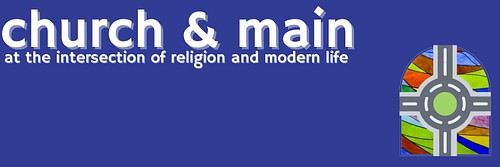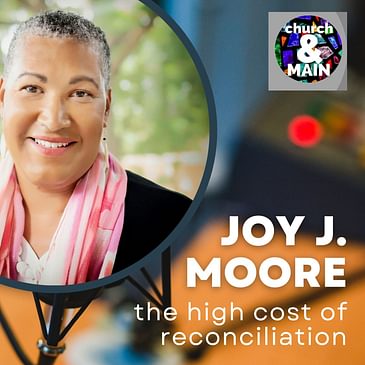In this bonus episode, I revisit an interview with Joy Moore, a professor of biblical preaching at Luther Seminary. We discussed reconciliation amid societal divisions. Moore shares stories illustrating the challenges of reconciliation and stresses the importance of finding common ground across racial divides. referencing instances like Ann Atwater and C.P. Ellis working together to desegregate schools, showcasing the power of partnerships across racial lines. She also mentions Hawk Newsome from Black Lives Matter emphasizing common values to bridge divides and underscores the importance of viewing each other as fellow humans created in the image of God.
Show Notes:
Speaking at a Trump Rally Made This BLM Activist an Outcast
Video of Hawk Newsome speaking at Trump Rally
Make a Donation: https://donorbox.org/support-church-and-main
Twitter: https://twitter.com/churchandmain
Facebook: https://www.facebook.com/churchandmain
Instagram: https://www.instagram.com/churchandmainpod/
Threads: https://www.threads.net/@churchandmainpod
Website: https://churchandmain.org/
YouTube: https://youtube.com/playlist?list=PL4CzMELfEV0oUYfbjdhdjqgrT3w8fHgl
Chapters:
0:36 Introduction 3:18 Finding Common Ground 6:03 The Story of Ann Atwater and C.P. Ellis 9:05 Hawk Newsome's Powerful Message[0:37] Welcome to this bonus episode of Church in Maine. This is a podcast for people who are interested in learning about the intersection of faith and modern life. Dennis Sanders, your host. As I said, this is a bonus episode, and it's actually a clip of an episode I did earlier this year with Joy Moore. Joy Moore is a professor of biblical preaching at Luther Seminary in St. Paul, Minnesota, and that happens to be my alma mater. She is currently the visiting professor of religion and chaplain Benson lecturer at Huntington College in Montgomery, Alabama. For those who don't know, Reverend Moore is a United Methodist minister. And there's also an interesting connection in that one of her last congregations that she served before coming to Luther was serving at Bethel United Methodist Church in Flint, Michigan, which is actually my hometown.
[1:40] So that was always interesting. And she is also one of three hosts of the Sermon Brainwave podcast that Luther Seminary puts out on their advised common lectionary. Uh this clip is it's a really good one because i think um we talk a lot in our culture about the our divisive nature um how we just seem as a society so divided um and um it seems really hard to kind of reach across anything and, If you do, you can get punished for it. And so one of the clips I wanted to share is really the cost of trying to be a reconciler. And she shares two stories about what that means to be someone that's willing to reach across a divide and really what the costs are to them. One note that I want to share is that I will be putting some links in. She references a video. So I will put a link to that video and also a background story to it. And I will put in a link to the full interview that I did with her earlier this year. And I would urge you to listen to it.
[2:53] So without further ado, also, well, before I forget, if you want to learn more about the podcast, go to churchinmaine.org. And you can listen to past episodes there. and also go to the Substack, which is churchinmaine.substack.com. So, now, I will say, without further ado, here is Joy Moore.
[3:19] I need folks to realize I'm not perfect, and I'm going to be as grace-filled to you as I possibly can. Can you return the favor? And if that's possible, then with humility, as you mentioned earlier, we come together and we try to find what are the things we share in common. And if I'm coming together simply to bridge the racial divide, it's not going to happen. I like to use the example of building Habitat houses, Habitat for Humanity houses. At that point, we all come together, most of us having no idea how to, you know, put up, I can't even say it, put up drywall, right? And we find our common inability laughable. And we have a common goal. And the goal is not to bring black folks and white folks together. The goal is to build this house. And all of a sudden, we realize that we can tell stories that sound a lot alike about how we grew up, coming in when the streetlights came on, playing hopscotch or jump rope, playing basketball without a hoop, right? Right.
[4:48] There are ways that our lives are similar that come out of sharing space that is more authentic when we share a common goal. And that goal has to be bigger than essentializing our difference created by the ideology of race. If that's if we are saying i need you to be black and i need you to be white and i i find it fascinating that while we talk about brown the reality is we only use that language for black and white no one would ever approach a person of asian uh ancestry ancestry, and that in itself is such a broad category. But no one would go to someone and call them yellow, right? But we use the language black and white. What does that mean? But if what we do is we come together as Americans, wow, what an incredible step to say. I preached this at Luther a couple of years ago.
[6:03] Ann Atwater and C.P. Ellis, a movie was made by them with Henson, Taraji Henson, playing Ann Atwater. It's how the schools were desegregated in Durham, North Carolina. Oh, I think I've heard about them. Yeah, Best of Enemies is the name of the movie. Great book, excellent movie, but I love Taraji. I do too. But she did a wonderful job of recreating the story of Ann Atwater, who was an African-American woman activist in the NAACP. And C.P. Ellis, also born in Durham, North Carolina, of white ancestry, he was the head of the KKK. Not exactly two people you expect to work together but what the NAACP recognized and they had to first convince Ann Atwater of this and then she was able to convince C.P. Ellis of this and that is that that to go all the way back to the early part of our conversation that king you wanted, that government that will take care of his cronies.
[7:28] There was a group of people that were creating a segregated system that was not serving poor whites. And what the NAACP realized was if they wanted to serve what was classified as poor blacks, which was all the blacks, They needed to partner with those in the white community who weren't being benefited by the school system. Poor whites. And the person to get that, who had the voice to speak to that community, was C.P. Ellis. And C.P. Ellis wanted his community to thrive. He cared about his children. And so he accepted Ann Atwater's invitation, and together they were able to move forward to desegregate the schools, but he lost everything.
[8:27] When he decided to work with and for persons of African descent, persons that identified or believed themselves to be white, disowned him. He lost all of his status. He was ostracized. In fact, when he died, Ann Atwater paid for his funeral. Fast forward to September 2016.
[9:06] Hawk Newsome, head of Black Lives Matter in New York City. He and a group of Black Lives Matter activists go to what was a Trump rally in Washington, D.C. On September, I want to say 2016.
[9:29] And they were given, he was given, Hawk Newsom was given two minutes to speak to these activists at the Trump rally. And what he did was he identified, I'm an American. I'm an African American, but I'm an American. I'm a Christian.
[9:52] I believe that our nation says that if you have a bad cop, you need to say something. Just like if you have a bad politician, you need to say something. And each time he made those kinds of rhetorical parallels, the audience began to lean in with him. And when he finished speaking, those people who would identify themselves as white supremacists, Christian nationalists, anti-Black Lives Matter, began to say they wanted to befriend him, that they realized that they had something in common with him. I invite your listeners to look up the YouTube recording of this in an interview, because I bring that story up because Hawk Newsome's mind was also changed. He realized what he said was true. If we are going to change the world, we must do this together. And when he went back to New York City, they didn't want him to be the leader or the voice for Black Lives Matter.
[11:13] Back to what I said earlier about fundamentalism on the left and the right. Whenever we have made an idolatry of any ideology, we are not going to find a way to find reconciliation. We have made the social constructed idea of race an idol. And until we remove that idol, we will not, from the left, from the right, I want to use the color language, from the black or the white side, We will not find reconciliation because reconciliation only comes when we find our identity as human beings created in the image of God.
[12:06] Music.








